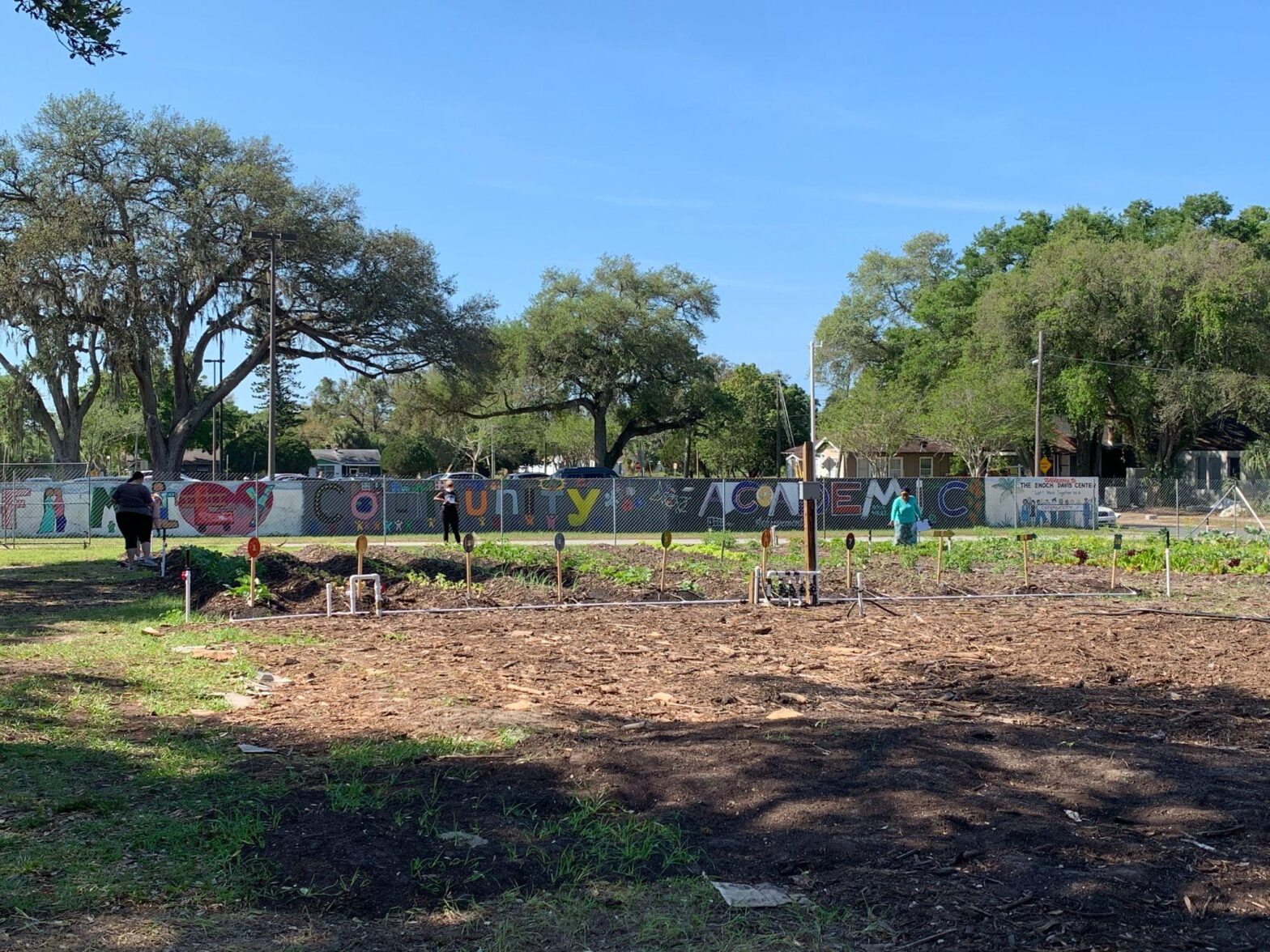Pictured Above: St. Pete Youth Farm hosted the Women’s Appreciation event on March 27. (USF/Catherine Burke)
By Catherine Burke
There is a clear discrepancy between health and nutrition equity in the St. Petersburg area.. A lack of community awareness around this issue is the reason why many people don’t pay attention to the clear nutrition deficit in the Midtown area of St. Petersburg.
Have you ever noticed the two Publix Supermarkets across the street from each other on the busy intersection of Fourth Street North and 38th Ave. North? What about the Winn-Dixie that backs right up to a Sam’s Club on Fourth Street North and 22nd Ave. N? Both of these examples include addresses containing the direction “North.” Head over to the south side of St. Petersburg and there isn’t a single full-functioning grocery store.
Nutritionist and St. Petersburg local, Wendy Wesley, thinks access to fresh produce in the south side of the city is scarce.
“Within a 42-block of St. Petersburg’s south side are two USDA-designated food deserts where access to fresh fruits and vegetables is severely limited,” Wesley said.
Wesley advocates for St. Petersburg because she recognizes that the closest food options for some families living in this area would be Dollar General stores and convenience stores, both of which offer no real nutritional food, only processed and packaged goods. These stores are not acceptable substitutes for real grocery stores that supply fresh produce and healthier food options.
Food insecurity has long plagued the south side of St. Petersburg. High poverty levels combined with zero access to nutritional food has much to do with the nutrition deficit.
Mandy Cloninger, the chief impact officer of Feeding Tampa Bay, thinks that the real problem is rooted much deeper than this.
“In addressing hunger and food insecurity we have to address the root causes – systemic racism and poverty,” Cloninger said.
According to Greater Chicago Food Depository, systemic racism is where you have public policies, institutional practices, cultural norms that reinforce differences and devalue people of one group as compared to another. And generally, that’s rooted in history. It disadvantages people of color and centralizes whiteness
Angela Odoms-Young,from the Greater Chicago Food Bank echoes a similar sentiment.
“Many people in Black, Latinx and Indigenous communities are drowning with unemployment, poverty and food insecurity,” Odoms-Young said. “Racism and discrimination are what’s pushing them into that river.”
As a community, St. Petersburg,, has a combined responsibility to do everything to stop this repeated history of food insecurity that is stemming from racism. Wesley herself has brought this to the attention of Mayor Rick Kriseman, City Council and people of power throughout the community.
She has advocated for the implementation of “DG Fresh” throughout the local Dollar General stores which would add a fresh fruits and vegetables section to the stores.
Aside from this, creative long-term solutions are necessary in the fight against food insecurity. One example of this would be the 2019 founding of the St. Pete Youth Farm in Midtown. The St. Pete Youth Farm is a community gardening program that involves local children to encourage a healthy lifestyle and sense of responsibility.
The Farm’s Collaboration Manager, Carla Bristol, has the brightest vision for this program.
“This is not only an opportunity for the children to learn important life skills, but they will bring home what they learned to their mother, father, brothers and sisters,” Bristol said. “Our hope is that this sets off a chain reaction within the community.”
Bristol left her career in the corporate world to pursue a more fulfilling life. She opened her own art gallery, Gallerie 909, to give a space to celebrate and honor the culture of the black community.
“Everything I do centers around community,” Bristol told The Gabber in 2020.
Now she has centered her life heavily around the youth of south St. Pete to create necessary change.
The goal of the St. Pete Youth Farm is to eventually progress into a full-functioning produce center where anyone can come to participate and purchase the locally grown food.
“We hope that these methods being highly visible in the community of greatest need will shift eating options and drive healthy outcomes,” Bristol said.
The St. Pete Youth Farm frequently hosts events to expand their reach within the community and get their name out there. On March 27, the farm hosted an event honoring notable black women who have had a strong impact within the community.
“It’s our responsibility to honor these women who work tirelessly to change the future and make this a better place to live,” Bristol said.
Additional programs to fight food insecurity in south St. Petersburg include the introduction of “SNAP Dollars” from Kenwood Organic Produce and the new Food Policy Council (FPC).
SNAP dollars allow low income families access to fresh produce from local farmers at a lower cost. This still benefits the local farm stands and promotes a healthy lifestyle for low income families who would otherwise have no access to these foods.
The FPO was created in light of COVID-19 which severely impacted people who were already affected by food insecurity. The council specifically comes up with ideas to counter the nutrition deficit in the area, working full-time to come up with new ideas for the future such as USF’s Hydroponic Farm that begins this summer.
The clear food inequity in areas of St. Petersburg can only be fixed when people are aware that there’s a problem.
Women like Wendy Wesley and Carla Bristol dedicate their lives to improving the health and wellness of this community. They believe that there is no problem too deep rooted in history that it cannot be fixed and that people have the right to access nutritional food.
Bristol believes in “thinking big.”
“I know where my ancestors have been and I know my role in the community to prevent further racism and discrimination,” Bristol said.
It begins with changing the norms and fighting for equal access to food across the city no matter one’s income or race.
It’s up to the citizens of St. Petersburg to aid Wesley and Bristol in their missions and change the course of history.

